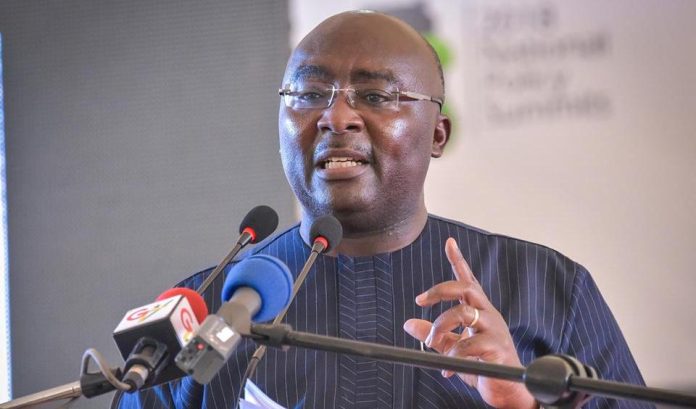Ghana’s Vice President Dr Mahamudu Bawumia has described critics of the government’s ‘Gold for oil’ programme which is aimed at addressing the exchange rate depreciation and rising fuel prices as people with an impossibility mindset and bleeding.
“Some people said it will not work. Ghana doesn’t have enough gold. How can you say that? We have been mining gold for 200 years. They keep taking it out and it cannot work for us. It doesn’t make sense.
“There are people who are disappointed that it is working but bleeding is allowed. We have an impossibility mindset. You can keep to it. For us, all things are possible by the grace of God,” Dr Bawumia said during the commissioning of the head office of the Bulk Oil Storage and Transportation Company (BOST) Limited in Accra on Wednesday, March 15, 2023.
According to Dr Bawumia, the introduction of the policy has helped to stabilise the Ghanaian cedi and triggered a fall in fuel prices in the West African nation.
“I am happy to note that the ‘Gold for Oil’ policy is the first policy of its kind in Ghana since independence to address this type of balance of payment crisis that we face. In my humble opinion, this is the most important macroeconomic policy intervention to deal with the exchange rate depreciation, fuel prices, food prices and inflation nexus that we have had.
“As a result of the policy, we have not only seen a decline in the price from 23 cedis per litre to around 12 cedis per litre, we have also seen stability in the exchange rate as we predicted. I say all thanks should go to the Ministry of Energy, BOST, NPA, the Bank of Ghana, the Ministry of Lands and Natural Resources and the PMMC who rose to the occasion when we faced those crises of rapidly depreciating currency along with rapidly increasing fuel, transportation and food prices.”
The Vice President, in November last year, announced that the government would use Ghana’s gold reserves to exchange for oil to stem the situation where oil importers rush for US dollars just to import, and thereby, putting pressure on the local currency.
Some Ghanaians, however, raised concerns over the lack of transparency in the policy.
Source: https://energynewsafrica.com
















